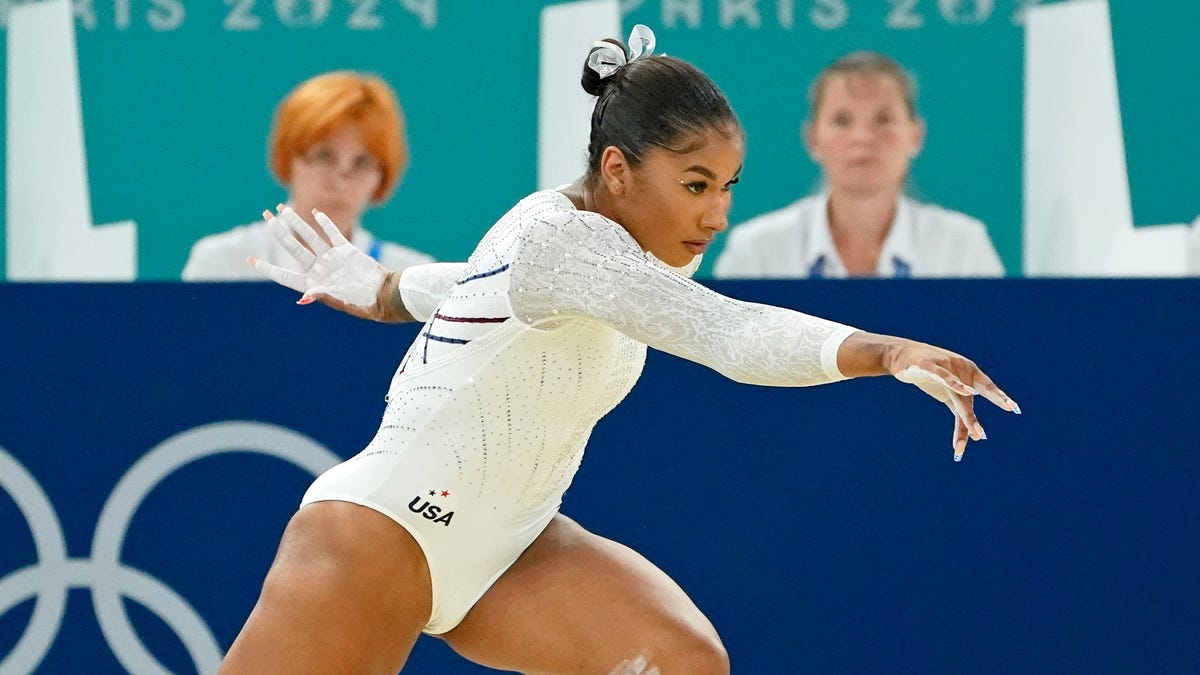Update on the Paris Gymnastics Scoring Issue and Jordan Chiles’ Bronze Medal
A recent ruling by the Court of Arbitration for Sport has added new tension to the gymnastics events at the 2024 Paris Olympics, potentially impacting Jordan Chiles’ chance of keeping her bronze medal.
The situation has evolved rapidly, making it hard to follow all the changes. With the announcement that CAS will not revisit its initial decision, let’s clarify the background, current status, and possible future implications for Chiles’ bronze medal in the floor exercise.
What led to the situation regarding Jordan Chiles?
This matter is complex because it involves an appeal of a previous appeal. During the women’s floor exercise finals over a week ago, Chiles’ score was raised from 13.666 to 13.766 after her coach, Cecile Landi, contested a deduction for a maneuver known as a tour jete full. This appeal, referred to as an “inquiry” in gymnastics, eliminated the deduction, placing Chiles in third place and pushing Romanian gymnast Ana Barbosu off the podium.
In response, the Romanian Gymnastics Federation turned to CAS, contesting the legitimacy of Landi’s appeal and seeking to revert Chiles’ score back to 13.666.
CAS sided with Romania, leading the International Gymnastics Federation (FIG) to adjust the official rankings, which in turn prompted the International Olympic Committee (IOC) to ask Chiles to return her medal for it to be awarded to Barbosu.
What is a tour jete full?
A tour jete is a gymnastic move that resembles a split leap, where a gymnast splits their legs while rotating in the air. The key issue for Chiles revolves around whether she completed the necessary rotation to earn the full difficulty score for this maneuver.
“I wasn’t at all sure about the inquiry, but what did we really have to lose?” commented Laurent Landi, one of Chiles’ coaches, immediately following the event. “I saw her perform it, and I felt it was significantly better than any of her previous meets, so why not?”
Why is this inquiry contentious?
The complexity stems primarily from Chiles performing last out of eight competitors, which meant her score directly influenced who would take home the bronze medal. By this stage, gold and silver had already been secured by Rebeca Andrade of Brazil and Simone Biles from the United States, respectively.
In most cases, the inquiry process is straightforward according to FIG rules, allowing coaches to challenge scores before the next competitor’s score is shown. However, for the last gymnast, the inquiry must be made within one minute “after the score is displayed on the scoreboard.”
Who was responsible for timing the inquiries?
FIG’s rules stipulate that a member of the judging panel is designated for this task.
According to FIG’s technical guidelines, “The person assigned to receive the verbal inquiry must log the time it is received, either manually or electronically, which initiates the procedure.”
However, FIG has not provided a response regarding who held this responsibility during the floor exercise finals in Paris when contacted by YSL News Sports.
The ambiguity surrounding the timing has resulted in conflicting accounts from the Romanian and U.S. gymnastics organizations. The Romanians claimed to CAS that the inquiry was made 64 seconds after Chiles’ score was displayed, which exceeds the allowable time by four seconds. Meanwhile, American officials asserted they had new video evidence indicating that the inquiry was made just 47 seconds after the score was shown, which would fall within the acceptable time limit.
What happens now?
USA Gymnastics has stated that CAS has indicated it will not reconsider its decision, despite the emergence of new evidence. Consequently, USAG and the U.S. Olympic and Paralympic Committee plan to appeal this decision before the Swiss Federal Tribunal, Switzerland’s highest court.
The Swiss Federal Tribunal typically only intervenes in CAS rulings when there are significant procedural errors, making it uncertain what basis the U.S. representatives will use in their appeal and whether it will be successful.
It is also unclear if Chiles will retain her medal while this appeal process is in progress.
Who ultimately decides if Chiles keeps her bronze medal?
Even after several days, the final authority remains ambiguous. Both FIG and IOC are shifting responsibility onto each other. A spokesperson for FIG noted via email that “medal reallocation is the IOC’s responsibility,” while an IOC spokesperson stated that “the International Federations establish competition results” and emphasized that “medal allocation is derived from those results.”
Ultimately, if an appeal is formally submitted, the Swiss Federal Tribunal will likely make the final determination.
Interestingly, the CAS decision noted that the Romanian Gymnastics Federation did not explicitly request for Chiles to be stripped of her medal. Instead, they asked the CAS to rank three gymnasts—Chiles, Barbosu, and another Romanian, Sabrina Maneca-Voinea—in third place. (Both Maneca-Voinea and Barbosu received scores of 13.700, but Barbosu won based on a superior execution score.)

